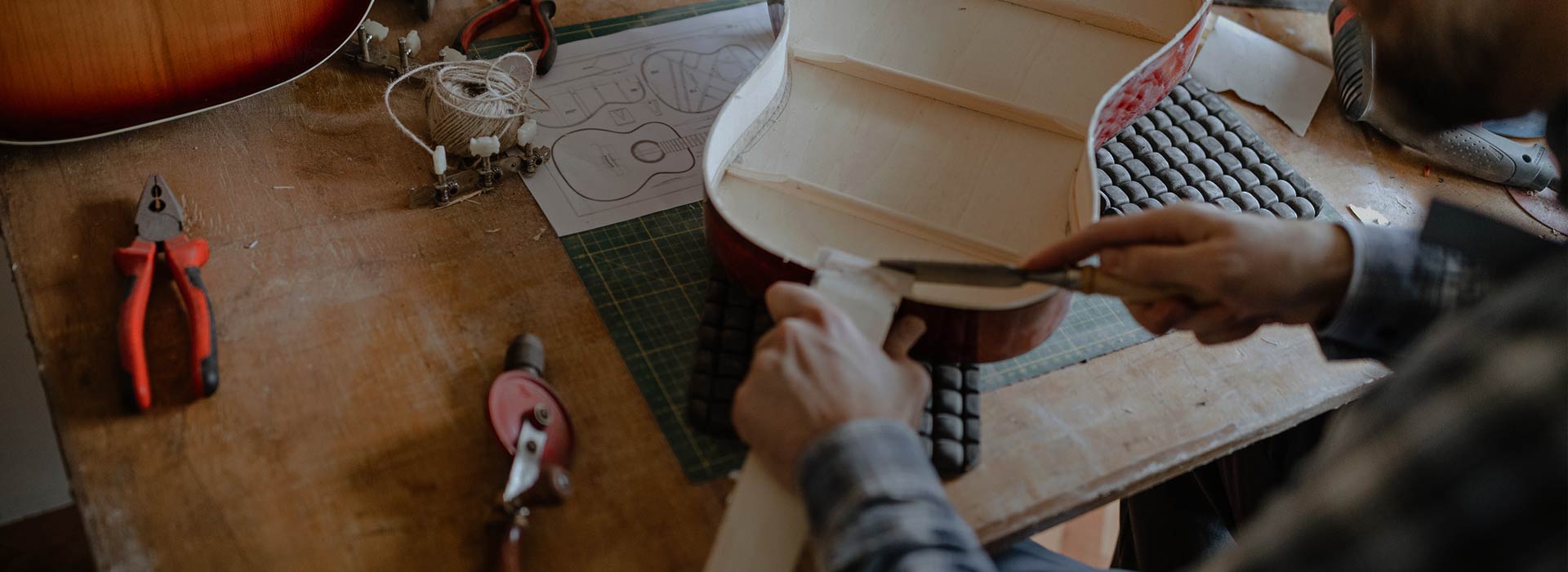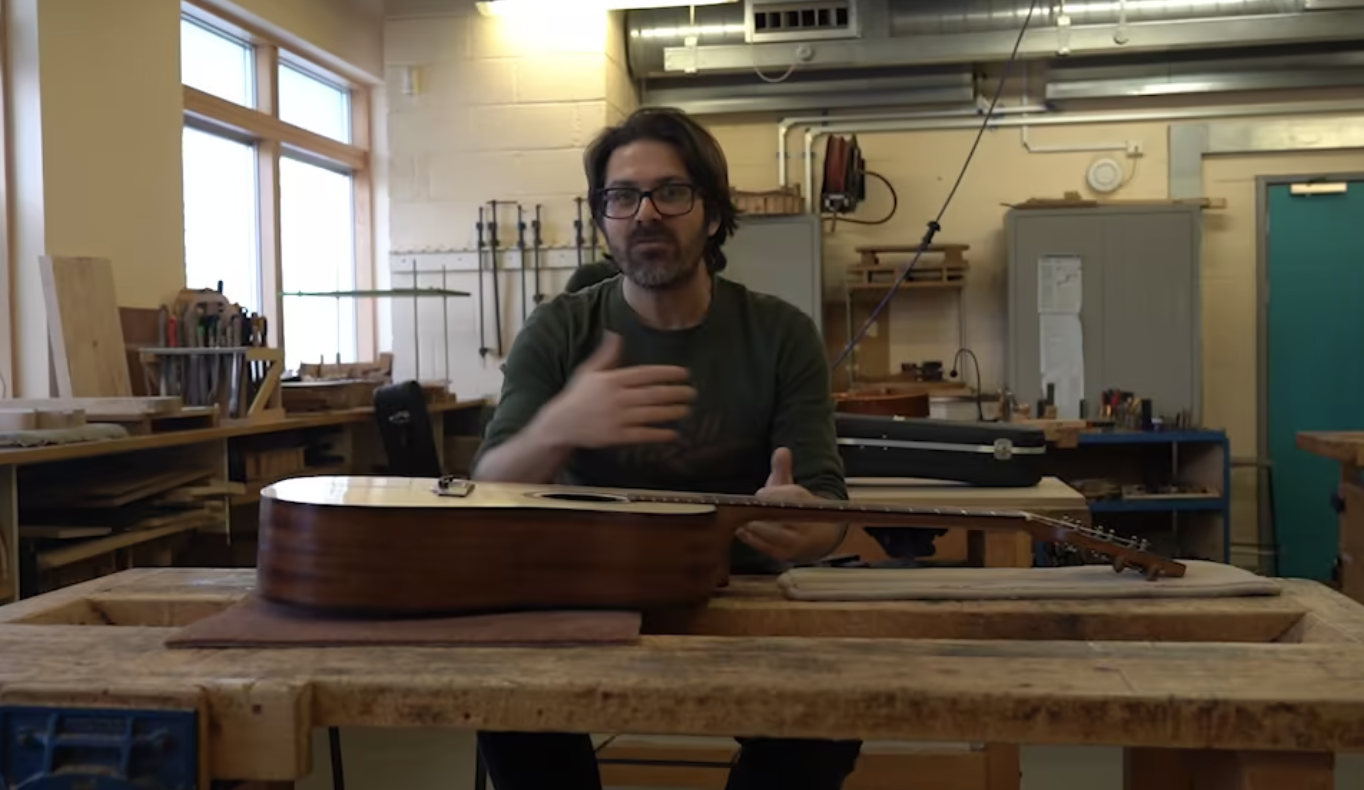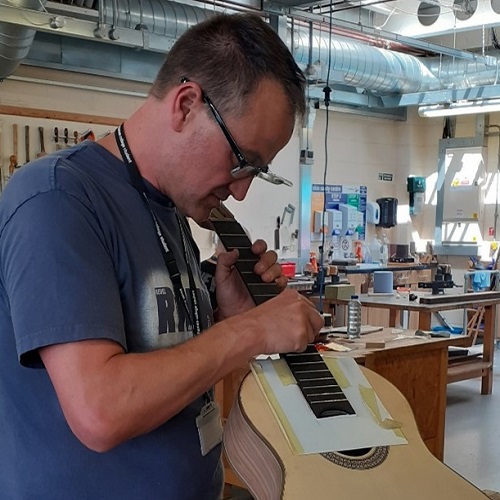Key Facts
-
Starting
18 Sep 2025- Location
- Merton
- Start Time
- 10:00
- End Time
- 16:00
- Duration
- 30 Weeks
- Study Mode
- Part Time Day
- Days
- Thursday
- Start Date
- 18 Sep 2025
- Level
- Short Course
- Code
- MABX020TL
Fees
- 19+ Fee
- £ 1,125
-
Starting
19 Sep 2025- Location
- Merton
- Start Time
- 10:00
- End Time
- 16:00
- Duration
- 30 Weeks
- Study Mode
- Part Time Day
- Days
- Friday
- Start Date
- 19 Sep 2025
- Level
- Short Course
- Code
- MABX021TL
Fees
- 19+ Fee
- £ 1,125

Guitar Making - Intermediate and Advanced
This course will start in Sept 2025. Please contact Martina.Collett-Creedy@stcg.ac.uk with any questions for future courses or this course.
Classical, steel string and electric guitars
This course offers the opportunity for students, who have completed the Beginner (Year 1) course, to continue and build on skills learnt and progress. The aim is to complete your first instrument or start new, learning new techniques as required, progressing using specialist tools and finishing processes.
This 30 week course runs on Thursdays and Fridays and can be enrolled as 1 or 2 days a week (2 days preferable).
-
Entry Requirements
You should have completed the Guitar Making for Beginners course. We are firmly committed to finding the right course for you to ensure you can flourish! Talk to us today if you have any concerns about the application process, we are here to help take you to the next level. -
Course Content
Following on from skills and knowledge learnt in year 1, in year 2 these will be enhanced and added to as follows: Classical, Steel String and Electric Use of hand and machine tools Understanding the design of the instrument to explore different tones/voice achieved Exploring different woods, their traditions and sustainability Explore methods of rib bending Understand the methods of bracing and tuning guitar fronts Explore neck joints used Understanding string lengths and the effect they have Cutting fret boards and setting frets and levelling Nut and saddle making, height of strings and intonation Explore various finishes used Repairing instruments (these can instruments bought in for repair to acquire a greater knowledge and understanding) The purchase of timber/hardware for each project is the responsibility of the student although the tutor will advise on selection. There is a fee which is a contribution towards the cost of tools and consumables used during the course. -
Progression Next Steps
You can further your knowledge by taking another course at the College. There are lots of opportunities available to you to progress across the South Thames Colleges Group and into the world beyond education. If you are interested in setting up your own business have a look at our self-employment and business courses. During your time with us you will have access to a dedicated team of careers and education advisors who will help you as you take the next steps towards achieving your goals. -
Additional Information
All courses run subject to demand and the content listed here should be used as a guide only. Course content may vary according to a range of factors such as course duration, campus, teaching staff and requirements from awarding bodies. Check our course and fee guidelines for further details. The Musical Instrument Technology courses are quite expensive to run compared with most courses. The fee is a contribution towards these costs. The money is used for a whole range of items- some of which are listed below. Full time students pay a larger fee which includes the necessary materials for the first instrument: evening class and part time students will need supply these themselves. Abrasives Adhesives Blades for bandsaws, scroll saws, coping saws, jewellers saws, scalpels Brushes Cleaning chemicals and materials Drill bits, router bits Fretwire Instrument fittings - pegs etc Instrument parts - bridges, rosettes, purfling and binding Lubricants and cutting fluids Machine maintenance lworking materials: steel for hardening & tempering Mould materials Reference books kept in workshop Replacement of broken or missing tools Routers, bits and accessories Screws & other fixings (nails, nuts and bolts) Solder & flux Specialist tools Varnishes, stains and solvents Wood for first instrument Wood for necessary jigs and toolsHowever, we reserve the right to either withhold or charge for materials used for work other than coursework.






